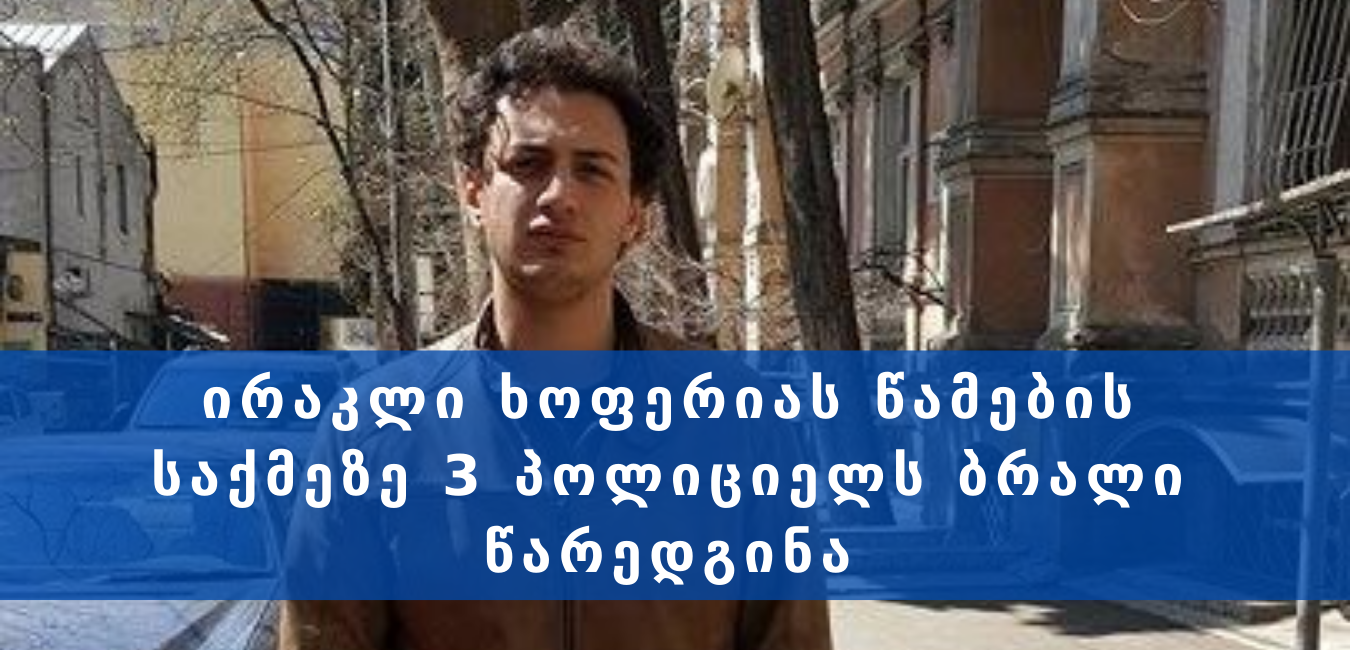


On July 28, 2020, the Chief Prosecutor’s Office of Georgia charged three police officers in Irakli Khoperia’s torture case. On July 29, the Tbilisi City Court sentenced all the three to imprisonment as a preventive measure. The pre-trial hearing of the case will be held on September 24, 2020.
On February 16, 2017, Irakli Khoperia was groundlessly taken by the police officers to Vake-Saburtalo District Police Department Division # 5, where he was subjected to torture. According to Irakli Khoperia, the police officers asked him to confess the crime that he had not committed, they threatened him with planting drug on him and at the same time physically and verbally abused him. After it was found out that he was arrested by mistake, instead of another person, he was released. The medical examination conducted at the initiative of Irakli Khoperia’s family confirmed the injuries on Irakli Khoperia’s body.
The investigation into the torture of Irakli Khoperia has been conducted by the Prosecutor’s Office of Georgia since March 15, 2017, under Subparagraph “a” of Paragraph 2 of Article 1441 of the Criminal Code (torture, committed by an official or a person holding equivalent position). However, in October 2017, the investigation was suspended on the grounds that there were no signs of the crime in the actions of the police officers identified. In November 2017, based on the decision of the Tbilisi City Court, the suspended investigation on the torture of Irakli Khoperia has been resumed. Since then, the investigation on the mentioned case was conducted by the Chief Prosecutor’s Office of Georgia. Despite the fact that numerous evidence obtained within investigation confirmed the fact of committing a crime against Irakli Khoperia, it took the Chief Prosecutor’s Office of Georgia more than three years to bring charge against the police officers. At the stage of filing a charge the Chief Prosecutor’s Office changed the qualification of the investigation and filed a charge against the police officers not under Subparagraph “a” of Paragraph 2 of Article 1441 but under Subparagraphs “b” and “c” of Paragraph 3 o Article 333 (exceeding the official powers committed by using violence or a weapon; by offending the personal dignity of the victim).
GYLA welcomes the filing of the criminal charge against the police officers by the Chief Prosecutor’s Office of Georgia and the determining of imprisonment against them as a preventive measure by the Court. However, according to the factual circumstances of the case, Irakli Khoperia was also mistreated by a fourth police officer, whose identity has not yet been established by the Chief Prosecutor’s Office of Georgia. Moreover, the case file revealed that during the investigation the police officers and other witnesses gave false testimony to the investigative bodies. Accordingly, it is important that the Chief Prosecutor’s Office of Georgia does not limit itself to accusing only these three persons and also establishes the responsibility of persons, who were directly involved in the criminal act or/and covered up the crime.
At the same time, we believe that the change of the qualification of the case at the stage of filing a charge by the Chief prosecutor’s Office of Georgia with Subparagraphs “b” and “c” of Paragraph 3 of Article 333, which envisages less severe sentence is problematic. The change of qualification in the Khoperia case once again underlines the systemic problem of correct qualification in the process of investigation into the cases of alleged ill-treatment committed by law enforcement officials.
Irakli Khoperia’s case is currently being considered at the European Court of Human Rights as well. In the complaint, GYLA requests the European Court to establish a violation of Article 3 (prohibition of torture) of the Convention on the grounds of ill-treatment of Irakli Khoperia and the ineffectiveness of the investigation launched into this fact.
ჯ. კახიძის #15, თბილისი, საქართველო, 0102 ; ტელ: (995 32) 95 23 53; ფაქსი: (995 32) 92 32 11; ელ-ფოსტა: gyla@gyla.ge; www.gyla.ge
15, J. Kakhidze str. 0102, Tbilisi, Georgia. Tel: (995 32) 95 23 53; Fax: (995 32) 92 32 11; E-mail: gyla@gyla.ge; www.gyla.ge